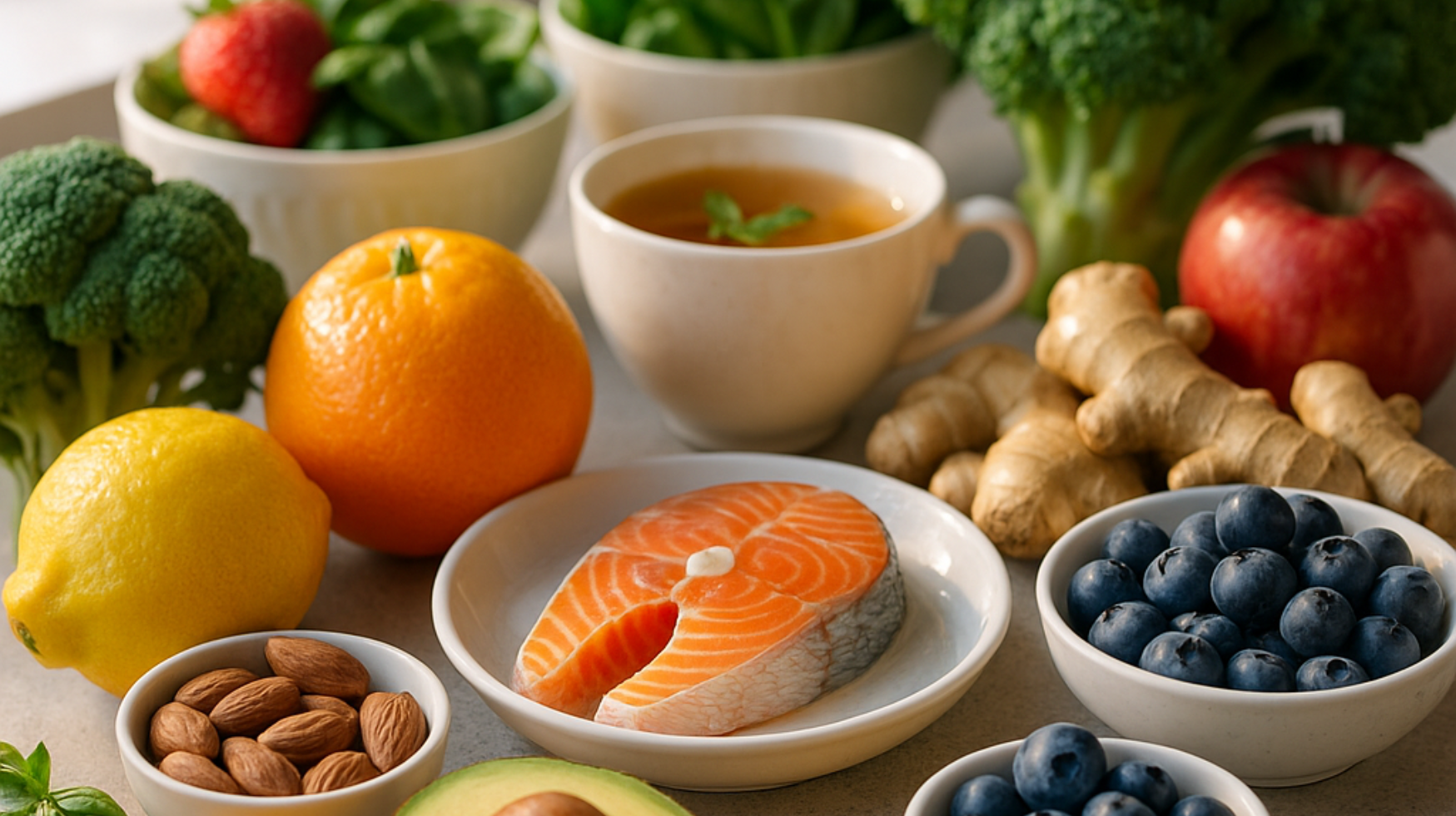Introduction: Your Body’s Defense System in Action
Your immune system is the ultimate bodyguard—working 24/7 to defend you against bacteria, viruses, and other harmful invaders. A strong immune system doesn’t just help you avoid seasonal colds; it supports faster recovery from illness, lowers inflammation, and even plays a role in reducing the risk of chronic diseases.
But immunity isn’t built in a single day. It’s the result of consistent lifestyle choices—what you eat, how you move, how well you rest, and how you manage stress. This guide will give you science-backed strategies to naturally strengthen your immune system, without relying on extreme diets or unproven “miracle” supplements.
Understanding How the Immune System Works
The immune system is a complex network of cells, tissues, and organs working together to keep you healthy. Key components include:
- White blood cells – Identify and attack pathogens
- Antibodies – Recognize and neutralize specific invaders
- The lymphatic system – Filters harmful substances and transports immune cells
- Bone marrow – Produces infection-fighting cells
- The spleen and thymus – Help regulate immune response
When your immune system is balanced, it can fight threats effectively without overreacting (which can lead to allergies or autoimmune diseases).
What Weakens Your Immune System
Before we talk about boosting immunity, it’s important to know what weakens it:
- Nutrient Deficiencies – Lack of vitamins and minerals impairs immune cell production.
- Chronic Stress – High cortisol suppresses immune activity.
- Poor Sleep – Weakens the body’s ability to fight infection.
- Lack of Physical Activity – Slows circulation of immune cells.
- Smoking and Excess Alcohol – Damage immune cells and increase inflammation.
- Dehydration – Reduces the efficiency of nutrient transport.
Step 1: Eat an Immune-Boosting Diet
Your diet is the foundation of your immune health. The right nutrients fuel immune cell production, reduce inflammation, and strengthen the body’s defenses.
Essential Nutrients for Immunity:
- Vitamin C – Stimulates the production of white blood cells. Sources: citrus fruits, kiwi, strawberries, bell peppers.
- Vitamin D – Regulates immune response. Sources: sunlight, salmon, fortified dairy.
- Zinc – Helps immune cells fight infections. Sources: beef, pumpkin seeds, lentils.
- Antioxidants – Reduce oxidative stress. Sources: berries, dark leafy greens, nuts.
- Protein – Needed for antibody production. Sources: chicken, fish, eggs, beans.
Sample Day of Immune-Boosting Meals:
- Breakfast: Greek yogurt with strawberries, chia seeds, and almonds
- Snack: Orange slices with a handful of walnuts
- Lunch: Spinach salad with grilled salmon, avocado, and pumpkin seeds
- Snack: Carrot sticks with hummus
- Dinner: Quinoa with steamed broccoli, roasted chicken, and olive oil drizzle
Step 2: Prioritize Quality Sleep
Sleep is when your body repairs, regenerates, and strengthens your immune system. During deep sleep, your body produces cytokines—proteins that target infection and inflammation.
Tips for Better Sleep:
- Aim for 7–9 hours per night
- Keep a consistent bedtime, even on weekends
- Avoid caffeine after 3 pm
- Make your bedroom cool, dark, and quiet
Step 3: Manage Stress for Immune Health
When you’re stressed, your body produces cortisol, which in high amounts suppresses immune function.
Stress-Management Strategies:
- Practice deep breathing exercises (4-7-8 method)
- Meditate for 5–10 minutes daily
- Take short breaks throughout the day to reset your mind
- Spend time in nature
Step 4: Stay Physically Active
Exercise increases circulation, helping immune cells travel more efficiently throughout the body.
Recommended Routine:
- 150 minutes of moderate exercise per week (walking, cycling, swimming)
- Include 2 strength-training sessions to maintain muscle mass
- Stretch or practice yoga for flexibility and stress relief
Step 5: Stay Hydrated
Water plays a crucial role in transporting nutrients and flushing out toxins.
Hydration Guidelines:
- Aim for 2–3 liters daily (more if you sweat heavily)
- Include herbal teas for added antioxidants
- Eat water-rich foods like cucumbers and watermelon
Step 6: Limit Toxins
Smoking and excessive alcohol weaken immune defenses and increase inflammation. Reducing or eliminating them will give your body a significant health boost.
Step 7: Support Gut Health
Around 70% of your immune system is located in your gut. A healthy gut microbiome strengthens immunity and reduces inflammation.
Gut-Friendly Foods:
- Yogurt, kefir, sauerkraut, kimchi (probiotics)
- Beans, lentils, oats (prebiotics to feed good bacteria)
- A variety of fruits and vegetables for fiber and nutrients
Step 8: Consider Evidence-Based Supplements
While food should be your main source of nutrients, supplements may help if you’re deficient:
- Vitamin D during winter months
- Zinc for immune support during illness
- Probiotics for gut health
Always consult your healthcare provider before starting supplements.
Sample Weekly Immune-Boosting Plan
Monday–Friday:
- Morning: Warm water with lemon + light stretching
- Breakfast: Protein + fruit + healthy fat
- Daily: 30-minute walk or workout
- Night: 7–9 hours of quality sleep
Weekend:
- Outdoor activity (hike, bike ride)
- Meal prep for the week
- Mindful relaxation (reading, meditation)
Final Thoughts: Building Immunity for Life
Boosting your immune system is not about quick fixes—it’s about creating a balanced lifestyle that supports your body every single day.
By nourishing your body with nutrient-rich foods, prioritizing rest, moving regularly, managing stress, and protecting your gut health, you can keep your immune system strong and resilient against everyday challenges.

